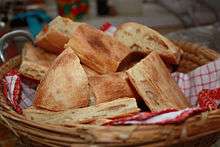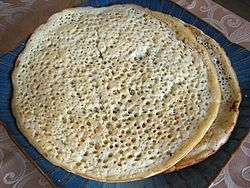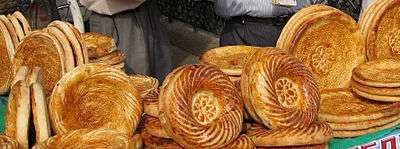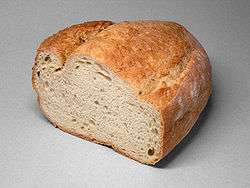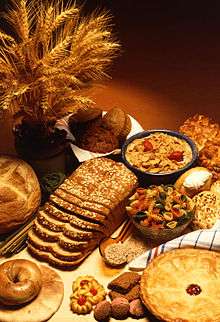Flatbread
A flatbread is a bread made with flour, water, and salt, and then thoroughly rolled into flattened dough. Many flatbreads are unleavened, although some are leavened, such as pita bread.
Homemade flatbread | |
| Type | Bread |
|---|---|
| Main ingredients | Flour, water, salt |
Flatbreads range from below one millimeter to a few centimeters thick so that they can be easily eaten without being sliced. They can be baked in an oven, fried in hot oil, grilled over hot coals, cooked on a hot pan, tava, comal, or metal griddle, and eaten fresh or packaged and frozen for later use.
History
In 2018, charred bread crumbs were found at a Natufian site called Shubayqa 1 in Jordan (in Harrat ash Shaam, the Black Desert) dating to 12,400 BC, some 4,000 years before the start of agriculture in the region. Analysis showed that they were probably from flatbread containing wild barley, einkorn wheat, oats, and Bolboschoenus glaucus tubers (a kind of rush).[1][2]
List of flatbreads
Europe

- Bannock (Scotland): a quick bread baked from grain
- Oatcake (United Kingdom)
- Blini (Russia)
- Bolo do caco (Madeira, Portugal)
- Borlengo (Italy)
- Farl (Ireland and Scotland)
- Flammkuchen/Tarte flambée (Alsace): thin bread dough rolled out in a circle or a rectangle and covered with onions and lardons
- Flatbrød (Norway): barley flour, salt and water, or potato, flour and salt, or peas flour and salt.
- Flatkaka (Iceland): rye flatbread
- Focaccia (Italy)
- Ftira (Malta)
- Hoggan (Cornwall): made from barley flour containing pieces of pork, and potato
- Hönökaka (Bohuslän): made from wheatmeal. The name is the commercial variant of the traditional name "bagebröd", meaning "baked bread".
- Lagana (Greece)
- Lefse (Norway)
- Lepinja (Croatia, Serbia)
- Lepyoshka (Russia)
- Pita (Hungary)
- Flatbrød (Norway)
- Pane carasau (Sardinia)
- Piadina (Italy): white flour, lard (or olive oil), salt and water
- Pita (Greece)
- Pită/Lipie/Turtă (Romania)
- Pissaladière (France)
- Pizza (Italy)
- Podpłomyk (Poland)
- Posúch (Slovakia)
- Părlenka (Bulgaria)
- Rieska (Finland)
- Somun and Lepina (Bosnia and Herzegovina)[3][4]
- Spianata sarda (Sardinia)
- Staffordshire oatcake (England)
- Tigella (Italy)
- Torta (Spain)
- Torta al testo (Umbria, Italy)
- Torta de Gazpacho (Spain)
- Tunnbröd (Sweden): any combination of wheat, barley and rye
Middle East and Africa
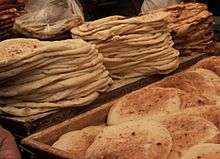
- Barbari (Iran)
- Bataw (Egypt)
- Bazlama (Turkey): made from wheat flour, water, and salt
- Chapati (Swahili coast, Uganda)
- Eish merahrah (Egypt): made with 5–10% ground fenugreek seeds and maize
- Gözleme (Turkey): folded over a savoury filling and fried on a griddle
- Gurassa (Sudan)
- Harsha|Harcha (Morocco): fried buttery bread made of semolina
- Injera (Horn of Africa): teff flour
- Khebz (Levant)
- Khubz (Arabian Peninsula)
- Khubz Asmr (Saudi Arabia) (Arabian Peninsula): made of wholemeal flour, yeast, and salt
- Khubz al-Jamri (Arabia, Northern Yemen): ash cake made by burying dough in hot ashes and embers.
- Khubz Muluwah (Yemen)
- Kissra (Sudan)
- Lahoh (Northern Somalia, Djibouti, Yemen)
- Lavash (Armenia)
- Moroccan Frena
- Lebanese Bread (Lebanon): white flour, dried yeast, sugar, salt and water
- Malooga (Yemen): water, yeast, salt and flour
- Markook (Levant)
- Matnakash (Armenia)
- Matzo (Jewish): white plain flour and water
- M'lawi (Tunisia): water, olive oil, semolina and flour
- Murr (Israel)
- Muufo (Somalia)
- Ngome (Mali): millet, water and vegetable oil
- Pita (Eastern Mediterranean, Turkey and Middle East)
- Pogača (Balkans and Turkey)
- Saj bread (Lebanon, Turkey, Israel)
- Sangak (Iran)
- Shotis Puri (Georgia)
- Taftan (Iran)
- Tonis puri (Georgia)
- Yufka (Turkey): wheat flour, water and salt
Central Asia
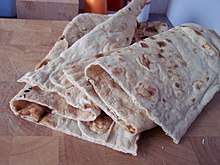
- Afghan bread or "Nan" (Afghanistan)
- Bolani (Afghanistan): a vegetarian flat-bread dish
- Obi Non (Afghanistan and Uzbekistan)
- Shelpek (Kazakhstan)
- Tandoor-nan (Central Asia)
- Tapansha, Taba nan (Kazakhstan)
East Asia
- Bindaeddeok (Korea): pancake made from mung bean flour
- Bing (China)
- Green onion pancake (China): made with oil and minced scallions (green onions)
- Laobing (China)
- Sanchuisanda (China)
- Shaobing (China)
South Asia
- Aloo paratha (India and Pakistan)
- Akki rotti (India)
- Appam (India): pancake made from fermented rice batter and coconut milk
- Bakarkhani (Bangladesh)
- Bhakri (India): made with water and millet flour
- Bhatura (Indian subcontinent): made with white flour, yogurt, ghee (or oil), and yeast
- Chapati (Indian subcontinent): made from atta flour (whole grain durum wheat), water and salt
- Chili parotha (India)
- Chikkolee (India)
- Dhebra (India)
- Dosa (India): pancake made from rice and black gram batter
- Gobi paratha (India and Pakistan)
- Jolada rotti (India)
- Kalai roti (Bangladesh)
- Kaak (Pakistan)
- Kachori (Indian subcontinent)
- Kothu parotta (India)
- Kulcha (Indian subcontinent)
- Luchi (India and Bangladesh): fine maida flour with water and a spoonful of ghee
- Makki di roti (India and Pakistan)
- Mughlai paratha (India and Bangladesh)
- Pathiri (India): is a traditional roti that originated from Malabar cuisine.
- Naan (Indian subcontinent and Central Asia): leavened with yeast, unlike Roti bread
- Cheese Naan (Indian subcontinent): A Naan bread filled with cheeses and local seasoning
- Nutella Naan/Paratha (Indian subcontinent): A Naan bread filled with Nutella or a paratha with similar spread
- Paratha (Indian subcontinent)
- Parotta (India and Sri Lanka)
- Pesarattu (India): pancake made from green gram (Mung) batter
- Phulka (Indian subcontinent): made from whole wheat flour, water and salt. It is like a baked variety of Puri.
- Poli (India): made from whole wheat flour, water and salt. It is folded and layered round flat bread.
- Pol roti (Sri Lanka): made from scraped coconut and wheat or kurakkan flour, with green chillis and onion
- Puri (Indian subcontinent): prepared from dough of atta and salt
- Ragi rotti (India)
- Roast paan (Sri Lanka): bread mixture baked in a flat mold, producing, literally, a 'flat' bread.
- Roti (Indian subcontinent)
- Rumali roti (Indian subcontinent)
- Sheermal (Indian subcontinent and Iran)
- Taftan (Indian subcontinent and Iran)
Southeast Asia
- Aparon (Philippines)
- Bánh (Vietnam)
- Kabkab (Philippines)
- Khanom buang (Thailand): rice flour
- Kiping (Philippines)
- Piaya (Philippines)
- Roti prata (Singapore)
- Roti canai (Indonesia and Malaysia)
- Roti tissue (Indonesia and Malaysia)
Americas
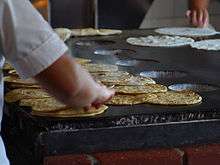
- Arepa (Colombia, Venezuela): flat, unleavened patty made of cornmeal
- Bammy (Jamaica): made from grated cassava root or cassava flour and salt
- Beiju (Brazil): made from tapioca
- Casabe (South America, Caribbean): made from bitter cassava root
- Frybread (United States)
- Native American Flatbread (North America): made from maize flour in a traditional style of early Native Americans; now topped with ground beef, vegetables, beans and cheese
- Pan de semita (Mexico)
- Pupusa (El Salvador)
- Johnnycake (North America and Caribbean)
- Tortilla (Mexico, Central and South America)
- Tortilla de Rescoldo (Chile): wheat flour based bread, traditionally baked in the coals of a campfire
References
- Colin Barras (21 July 2018). "Stone Age bread predates farming". New Scientist. 239 (3187): 6. Bibcode:2018NewSc.239....6B. doi:10.1016/S0262-4079(18)31274-0.
- Amaia Arranz-Otaegui; et al. (16 July 2018). "Archaeobotanical evidence reveals the origins of bread 14,400 years ago in northeastern Jordan". PNAS. 115 (31): 7925–7930. doi:10.1073/pnas.1801071115. PMC 6077754. PMID 30012614.
- Rodolfo Toe (3 May 2013). "Sarajevo Bakery Braces for Ramadan Bonanza". Balkan Insight. Retrieved 5 September 2018.
- Celjo, Farah. "Serbian crepes are just one reason to try Fabrika by Madera: SBS Food". Sbs.com.au. Retrieved 5 September 2018.
Further reading
- 2005. "High-Profile Flatbreads - Say Goodbye to Insipid White Bread When Tortillas and Flatbreads Come to Town". FOOD PRODUCT DESIGN -NORTHBROOK-. 15, no. 1: 96-114. ISSN 1065-772X.
- 2008. "Flatbreads Old World: Meets New Flatbreads from All Over the World-Including Tortillas, Arepas and Naan-Are the Newest Hot Ticket in Both Retail and Foodservice Products". FOOD PRODUCT DESIGN -NORTHBROOK-. 18, no. 11: 38-43.
- 2008. "Storied Breads: With a Continuing Focus on Food Origin, Flatbreads Offer Manufacturers a Way to Tempt Consumers with Authentic Products Celebrating the Oldest-Known Bread Traditions". BAKING AND SNACK. 30, no. 7: 35-42. ISSN 1092-0447.
- 2011. "Flat-Out in Love with Flatbread Here Are 5 Reasons Foodservice Is Smitten with Flatbreads". FOOD MANAGEMENT -NEW YORK THEN CLEVELAND OH-. 46, no. 11: 30-35. ISSN 0091-018X.
- Alford, Jeffrey, and Naomi Duguid. Flatbreads and Flavors: A Baker's Atlas. New York: W. Morrow, 1995. Summary: Recipes for more than sixty varieties of flatbreads along with 150 recipes for traditional accompaniments to the breads, including chutneys, curries, salsas, stews, mezze, smorgasbord, kebabs, etc.
- Craddock, Anne. Textural Characteristics of Bagels and Ethnic Flatbreads. 1998. Thesis. 124 leaves.
- German, Donna Rathmell. Flatbreads from Around the World. San Leandro, Calif: Bristol Pub, 1994.
- Hansen, Eric. 2015. "Fabled Flatbreads of Uzbekistan." Aramco World. July/August 2015. Pages 32–39.
- Helou, Anissa. Savory Baking from the Mediterranean: Focaccias, Flatbreads, Rusks, Tarts, and Other Breads. New York: William Morrow, 2007.
- Kahlon, Talwinder Singh, and Mei-Chen Maggie Chiu. 2014. "Ancient Whole Grain Gluten-Free Flatbreads". Food and Nutrition Sciences. 05, no. 17: 1717-1724.
